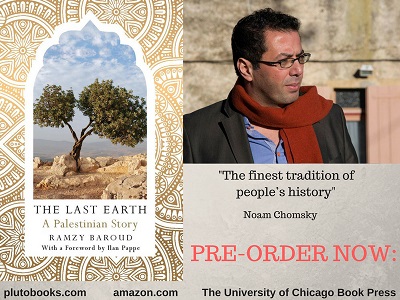by VACY VLAZNA

The Last Earth: A Palestinian Story by Ramzy Baroud (London: Pluto Press, 2018.
Dr. Ramzy Baroud’s new book, The Last Earth: A Palestinian Story is described simplistically as ‘non-fictional narrative of modern Palestinian history.’
It is much, much more; for us readers, it is an intimate encounter, chapter by chapter, wherein we are entertaining new friends; having the privilege of listening to, savoring and indeed cherishing the rarely heard Palestinian stories saturated with the fears, joys, suffering, triumphs of the human spirit.
Baroud’s approach and praxis of a people’s history debunks the traditional accepted notion of Carlyle’s Great Man theory which proposes,”The history of the world is but the biography of great men” with the Elite Hero as its absolute focal point.
Baroud, however, by honoring the archetypal hero within our deepest selves connects us to the shared aliveness of the Palestinian Other; of Khaled, Jamal, Tamam, Um Marwan, Kamal, Hana, Sara, Ali, Leila and many more as well as solidarity friends like Joe.
With alchemical brilliance, he has, in the crucible of his art, purified hours of recorded interviews on love stories, generations of births, childhoods, disappearances, adversity, torment, deaths into the essence of Love and Truth and the magic is – we too are purified and illumined by a powerful knowing that can never be un-known.
As an activist, commentator, author, editor, poet, Baroud’s prodigious energy equals his prodigious sense of responsibility to Palestine’s struggle for political and human rights. His articles have an intellectual discipline to fine analysis and facts, whilst under the poetic sheen of The Last Earth, honesties are excoriated and refined through a powerful emotional turbulence; tender and intolerable.
The Last Earth presents eight personal stories, I shall touch only upon three stories, The Spirit of the Orchard, Death Note and Letters to Heba and leave the remaining five for your discovery.
The Spirit of the Orchard encapsulates the revolutionary spirit that is rooted in the earth of Palestine, grows upward through Palestinian hearts and rendered a force by family. Across three generations trapped in Israeli brutality, the story of Yousef, Hamda, Salim, Um Marwan, Mahmoud and their children, Marwan, Kamal, Iman proves that, when Palestine and her children are under threat, ordinary people become heroic and women emerge from their kitchens and orchards as lionesses wedging themselves “between screaming children and angry soldiers” and tend, like Fatima, to the wounds of Palestine’s freedom champions. That is is a true story is both sobering and soaringly inspirational.
Death Note: News of Hana Shalabi’s arrest and her later deportation to Gaza never revealed what happened in between. Her story expands beyond the news bites to the Nakba and her family’s expulsion from Haifa to Burqin near Jenin where her father, Yahya and mother, Badia met and married, where her teenage neighbor, Mohammed was shot by Israeli soldiers before her eight-year old eyes, where her revolutionary siblings Omar and Amar and sister, Huda were arrested, where nearby Israelis crushed Palestinian resistance and demolished the camp, where her martyred brother Samir is buried, where Hana was arrested without evidence for being a threat to Israel by the Palestinian Authority which turned her over to the Israelis. Hana’s phenomenal defiance is measured above and beyond the humiliation, physical and mental torture she endured for 25 months. The brutality was repeated with her second arrest in 2012 and this time her demand for justice was a hunger strike for 47 days that brought her to death’s edge and exile to Gaza.
Palestine Chronicle for more
